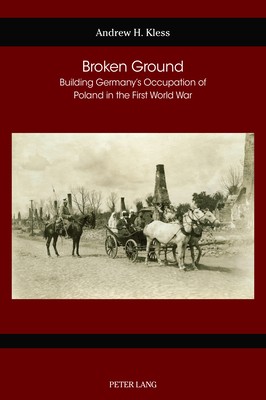
- We will send in 10–14 business days.
- Publisher: Peter Lang Ltd, International Academic Publishers
- ISBN-10: 1800793138
- ISBN-13: 9781800793132
- Format: 15.2 x 22.9 x 2.1 cm, minkšti viršeliai
- Language: English
- SAVE -10% with code: EXTRA
Broken Ground; Building Germany's Occupation of Poland in the First World War (e-book) (used book) | bookbook.eu
Reviews
Description
ëBased on extensive archival sources, this book provides a much-needed look behind the surface of the Imperial German state at war. In contrast to the image of a rapacious and finely tuned war machine, Kless illustrates the frictions, uncertainties, and rivalries that marked Germany's often confused attempts to create an occupation regime in Poland.û
(Dr. Jesse Kauffman, Professor, Eastern Michigan University)
ëOccupations are often described in terms of their consequences, with the beginnings being neglected. Andrew Kless shows how an occupation in Russian Poland came into being during a critical time in the First World War--it emerged from the ground. He therefore fills an important gap in research.û
(Dr. Christian Westerhoff, Director, Library for Contemporary History (Bibliothek für Zeitgeschichte) Landesbibliothek Baden-Württemberg, Stuttgart)
Broken Ground captures Germany's tumultuous first year of the First World War, as it built an occupation administration from scratch between August 1914 and August 1915. Borderlands of the German, Russian, and Austro-Hungarian Empires became battlegrounds. The German army, struggling to maintain order in a thin strip of war-ravaged, ethnically Polish territory seized from Russia, called for the aid of bureaucrats from the German Kingdom of Prussia to form the Civil Administration for Russian Poland. With few resources, the civilian administrators relied on independent Polish citizens committees and militias to maintain order and called upon the American Rockefeller Foundation to intervene philanthropically to provide food aid. Despite these immense challenges, the enterprising administrators built an enduring occupation administration. They created new offices and departments from finance to forestry, mining to medical. They hired wounded soldiers and aged university professors and self-funded their operation through taxes and tariffs. Their growth was not a directive of Berlin but a product of their own ambition. After the May 1915 Gorlice-Tarnów Offensive and capture of Warsaw, the Civil Administration was adopted into Germany's German General Government of Warsaw entirely. The broken ground of the first year of war guided the remainder of Germany's occupation of Poland in the First World War.
This book project was the Joint Winner of the 2020 Peter Lang Young Scholars Competition for German Studies in America.
EXTRA 10 % discount with code: EXTRA
The promotion ends in 23d.15:13:44
The discount code is valid when purchasing from 10 €. Discounts do not stack.
- Publisher: Peter Lang Ltd, International Academic Publishers
- ISBN-10: 1800793138
- ISBN-13: 9781800793132
- Format: 15.2 x 22.9 x 2.1 cm, minkšti viršeliai
- Language: English English
ëBased on extensive archival sources, this book provides a much-needed look behind the surface of the Imperial German state at war. In contrast to the image of a rapacious and finely tuned war machine, Kless illustrates the frictions, uncertainties, and rivalries that marked Germany's often confused attempts to create an occupation regime in Poland.û
(Dr. Jesse Kauffman, Professor, Eastern Michigan University)
ëOccupations are often described in terms of their consequences, with the beginnings being neglected. Andrew Kless shows how an occupation in Russian Poland came into being during a critical time in the First World War--it emerged from the ground. He therefore fills an important gap in research.û
(Dr. Christian Westerhoff, Director, Library for Contemporary History (Bibliothek für Zeitgeschichte) Landesbibliothek Baden-Württemberg, Stuttgart)
Broken Ground captures Germany's tumultuous first year of the First World War, as it built an occupation administration from scratch between August 1914 and August 1915. Borderlands of the German, Russian, and Austro-Hungarian Empires became battlegrounds. The German army, struggling to maintain order in a thin strip of war-ravaged, ethnically Polish territory seized from Russia, called for the aid of bureaucrats from the German Kingdom of Prussia to form the Civil Administration for Russian Poland. With few resources, the civilian administrators relied on independent Polish citizens committees and militias to maintain order and called upon the American Rockefeller Foundation to intervene philanthropically to provide food aid. Despite these immense challenges, the enterprising administrators built an enduring occupation administration. They created new offices and departments from finance to forestry, mining to medical. They hired wounded soldiers and aged university professors and self-funded their operation through taxes and tariffs. Their growth was not a directive of Berlin but a product of their own ambition. After the May 1915 Gorlice-Tarnów Offensive and capture of Warsaw, the Civil Administration was adopted into Germany's German General Government of Warsaw entirely. The broken ground of the first year of war guided the remainder of Germany's occupation of Poland in the First World War.
This book project was the Joint Winner of the 2020 Peter Lang Young Scholars Competition for German Studies in America.


Reviews